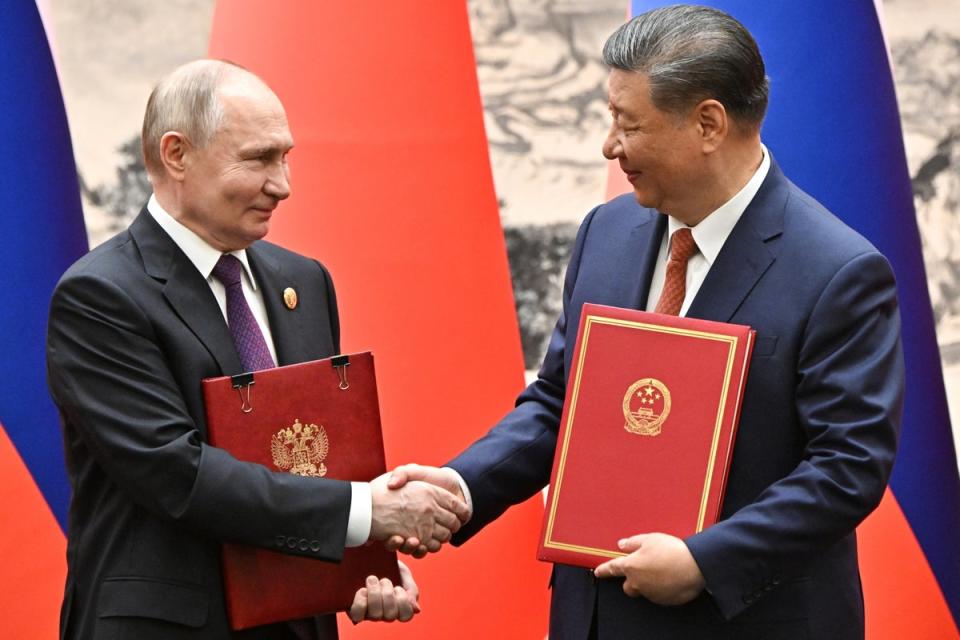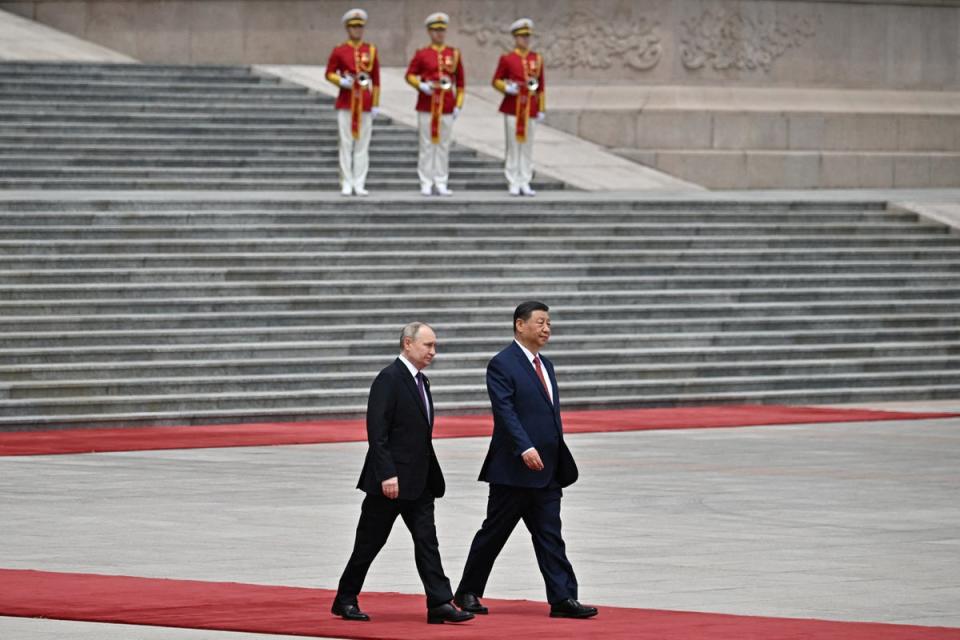Putin and Xi Jinping claim their ‘unprecedented partnership’ is a stabilising influence at Beijing talks
- Oops!Something went wrong.Please try again later.
- Oops!Something went wrong.Please try again later.
Vladimir Putin and his Chinese counterpart Xi Jinping held talks in Beijing on Thursday aimed at presenting a united front amid the pomp and spectacle of a state visit that was being closely watched around the world.
There was not a great deal of substance to the statements issued publicly by the two leaders after their meeting, which included a state dinner on Thursday night as well as talks ranging across a broad range of subjects from the war in Ukraine to their shared trade interests.
But nor was there any sign that recent US sanctions against Chinese companies exporting to Russia had dampened Mr Xi’s enthusiasm for relations with the man he welcomed as his “old friend”.
Mr Putin arrived in Beijing in the early hours of Thursday and was later welcomed formally with a 21-gun salute, a guard of honour and a marching band playing Moscow Nights as he met Mr Xi at the Great Hall of the People.
The two-day trip is Mr Putin’s first abroad since he began his fifth term as Russian president, a symbolic gesture that also comes at a strategic junction, coming just a week after Mr Xi completed a five-day charm offensive across Europe that included a warm welcome in France. France’s Emmanuel Macron has in recent months become a leading hawk among European leaders when it comes to Ukraine, refusing to rule out French boots on the ground if the need arises.
Ukraine featured extensively in Thursday’s discussions in Beijing, with Mr Xi standing alongside Mr Putin as he said: “China hopes for the early return of Europe to peace and stability and will continue to play a constructive role toward this.”
Mr Putin referred euphemistically to the war he started against his European neighbour as “the situation in Ukraine”, and the two said they agreed there should be a “political solution” to the Russia-Ukraine war.
Mr Putin also thanked Mr Xi for China’s initiatives to resolve the Ukraine conflict at a Beijing summit last year, when China offered a broad plan for peace outlining general principles for ending the war in Ukraine. The problem is that China’s plan for peace does not tally with the stance of either Ukraine or its Western backers – that Russia must withdraw from the territory it has captured so far before talks to end the conflict can begin in earnest. Mr Putin’s statements also ignore the fact that he could end the conflict overnight by simply ordering his forces to fall back.
If Mr Xi’s support for his ally’s war in Ukraine remains only tacit, there were plenty of overt expressions of the closeness and importance of their relations. Mr Putin said he chose China for his first trip since resuming the office of president thanks to “the unprecedented level of our strategic partnership”.

Mr Xi lauded the ties between their two countries as “a model for a new type of international relations and relations between neighbouring major powers.”
He said that the two countries “always firmly support each other on issues involving each other’s core interests and major concerns.”
The two leaders have pledged to maintain a “no-limits” relationship since the beginning of the Ukraine war, and Mr Putin also referred to the sanctions that have levied as a result of his invasion when he spoke of Sino-Russian trade.
“Despite some actions aimed at restraining our development — some actions on the part of third countries — trade turnover between Russia and China is increasing at a good pace,” Mr Putin said.
“Our cooperation in world affairs today serves as one of the main stabilising factors in the international arena,” he added.

Analysts said the talks show the two countries are only becoming more entrenched in their view that they each other’s support to challenge a US-led world order.
"Both sides want to show that despite what is happening globally, despite the pressure that both sides are facing from the US, both sides are not about to turn their backs on each other anytime soon," said Hoo Tiang Boon, a professor who studies Chinese foreign policy at Singapore’s Nanyang Technological University.
“I and President Putin agree, we should actively look for convergence points of the interests of both countries, to develop each’s advantages, and deepen integration of interests, realising each others’ achievements,” Mr Xi said.
A joint statement signed by both leaders included plenty of platitudes, but there were also some new agreements on trade. The two sides agreed following their talks that they would work to ensure the economic and energy security of both countries, with Mr Putin noting that Russia is a reliable supplier of energy to China.
Mr Putin also declared that “we welcome Chinese carmakers in our market,” a nod to the fact that the Biden administration just announced it is quadrupling tariffs on China’s electric vehicles to 100 per cent.
Both said they would work together on large-scale energy projects by companies from both nations, and deepen cooperation in areas such as renewable energy, hydrogen energy and carbon markets, according to CCTV.
Moscow has diverted the bulk of its energy exports to China and relies on Chinese companies for importing high-tech components for Russian military industries to circumvent Western sanctions.
Mr Putin also noted that the their 90 per cent of trade was in made in roubles and yuan in what he said was a “timely” decision that boosted the trade.
Their meeting comes ahead of the 2024 Brics Summit, a block aims to counterbalance the dominance of Western financial institutions and whose chair is Russia for this year. One of the bloc’s aim is dedollarisation, to reduce reliance on the US dollar in international trade and finance.

